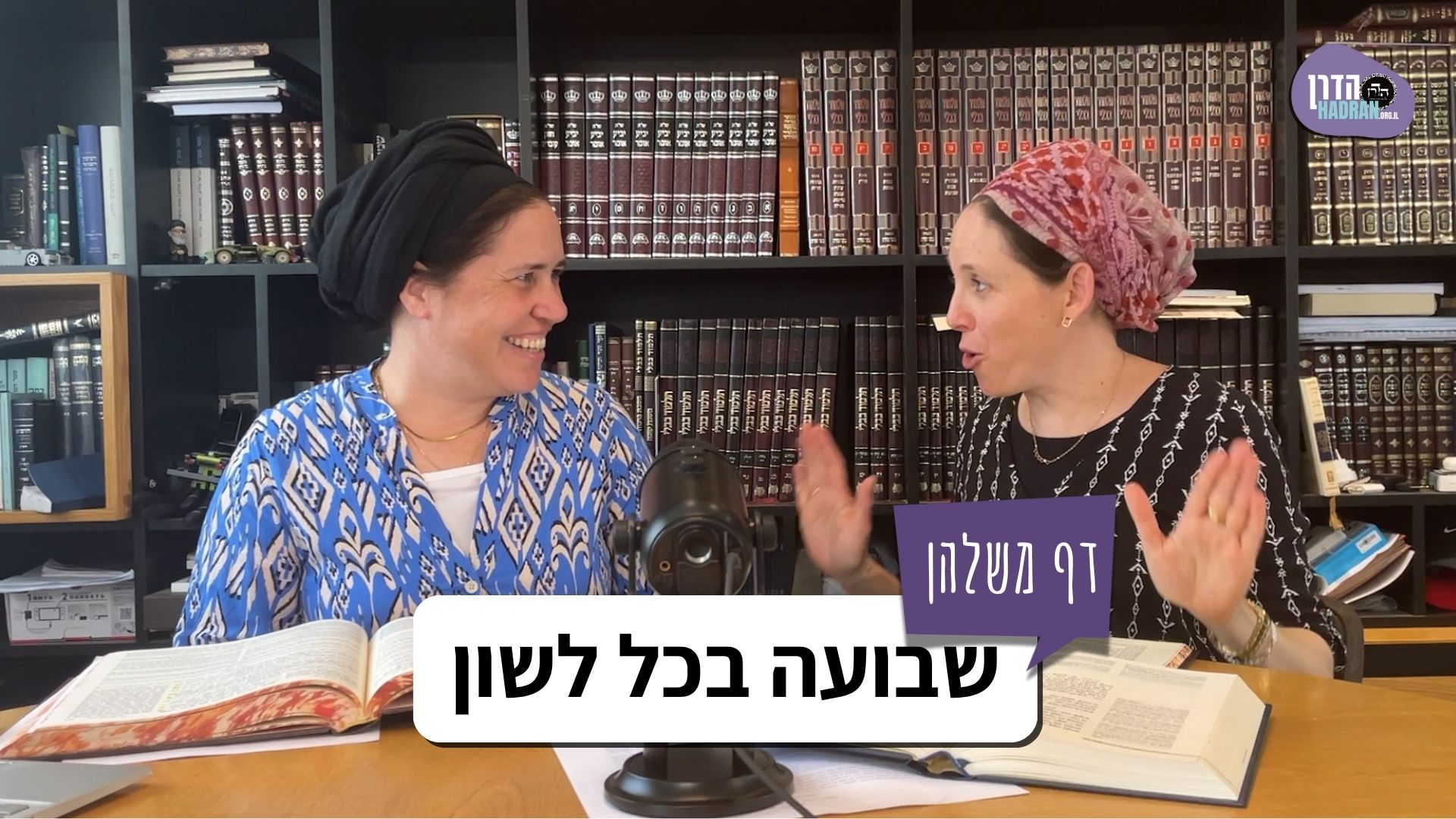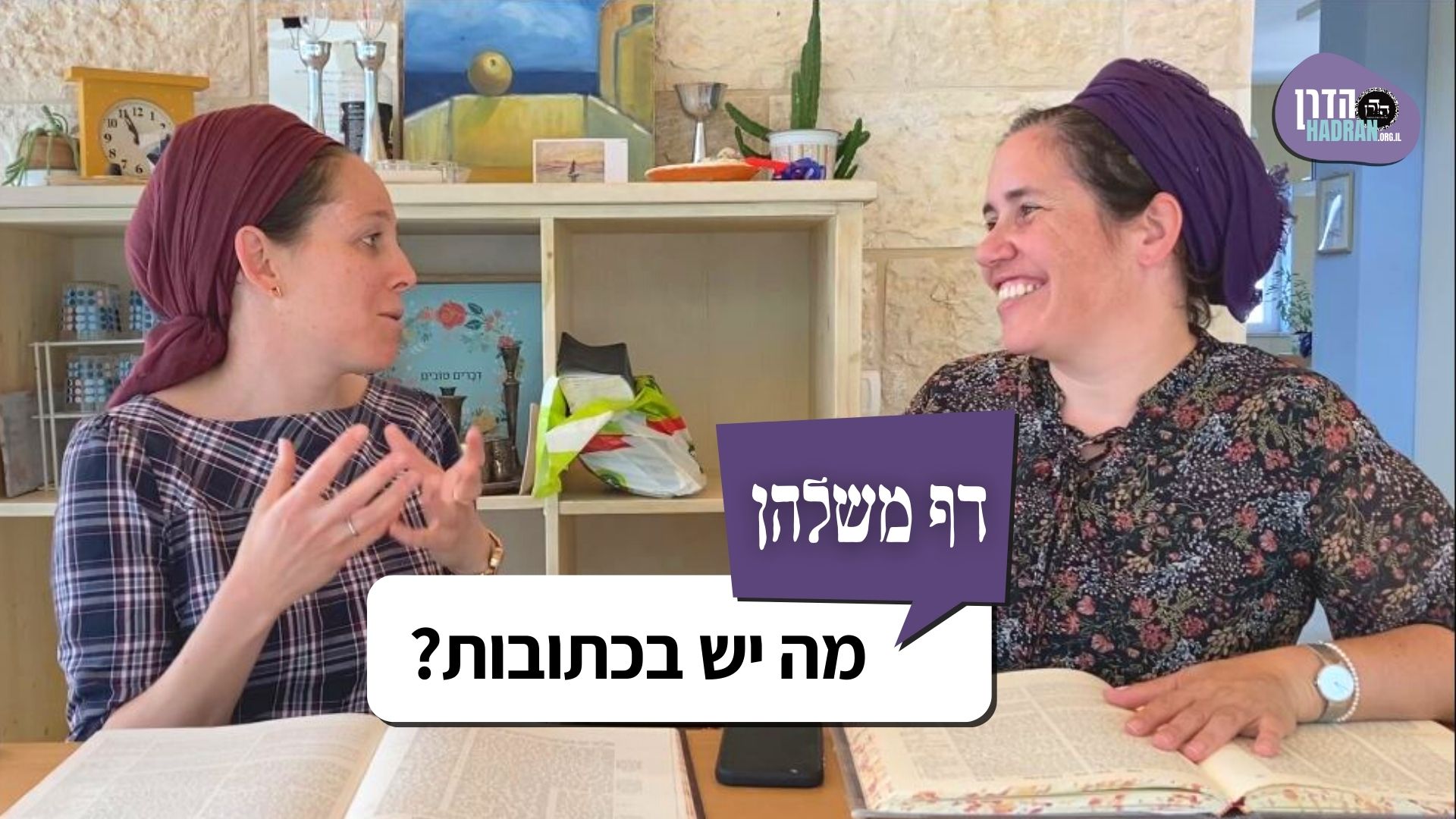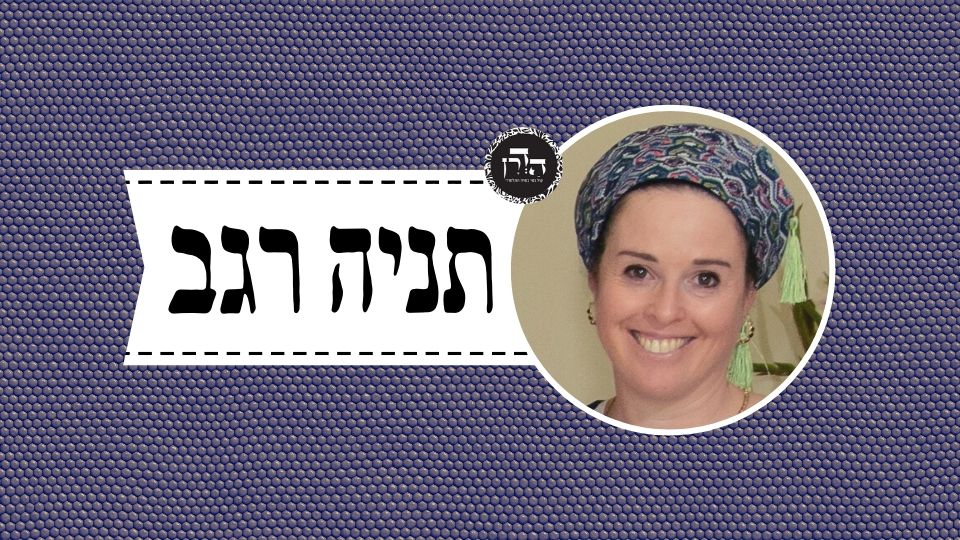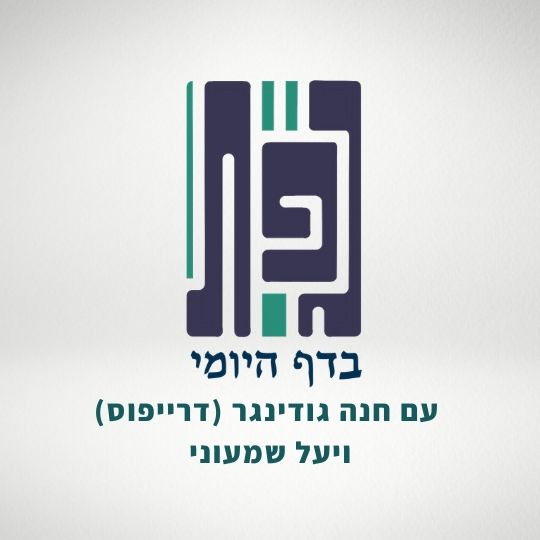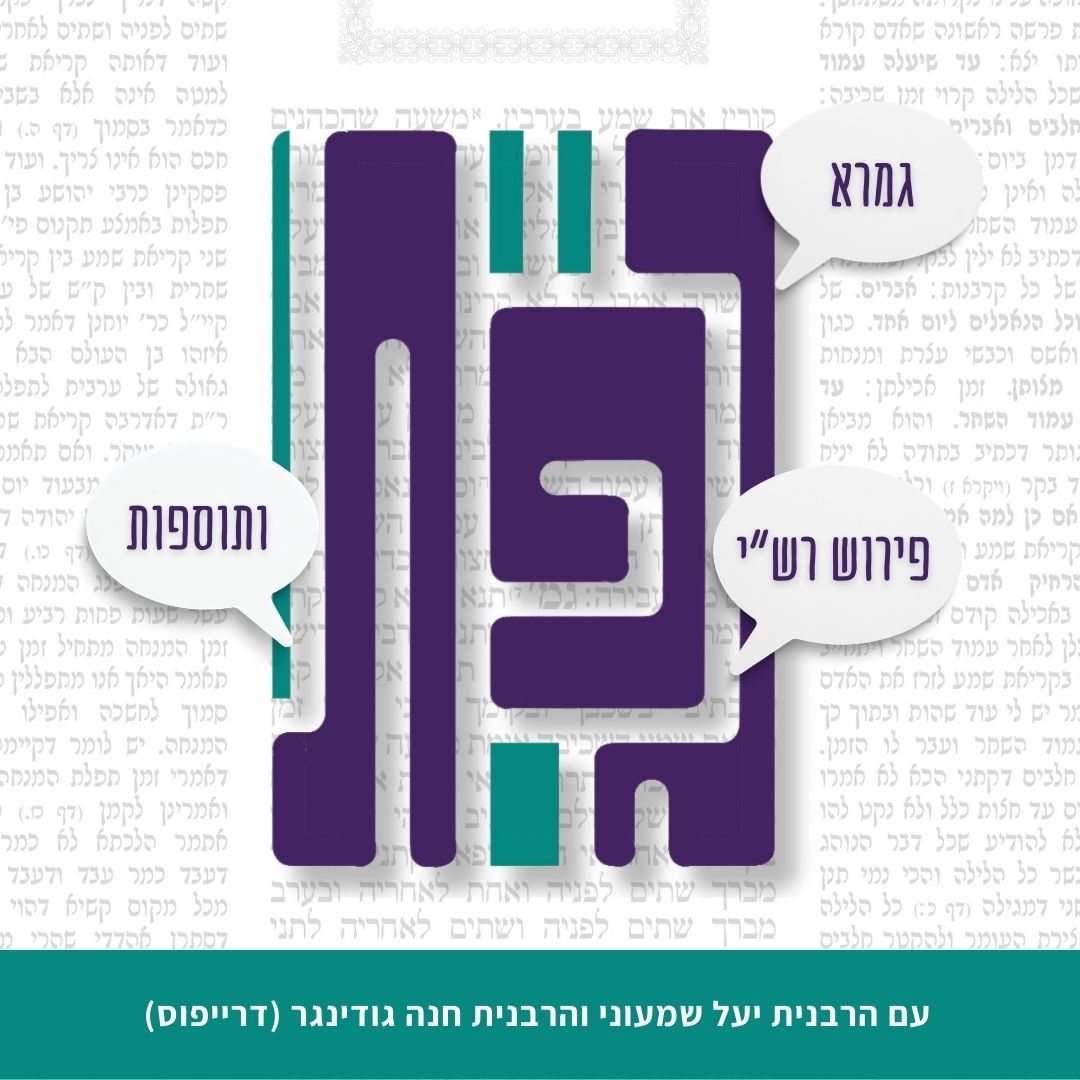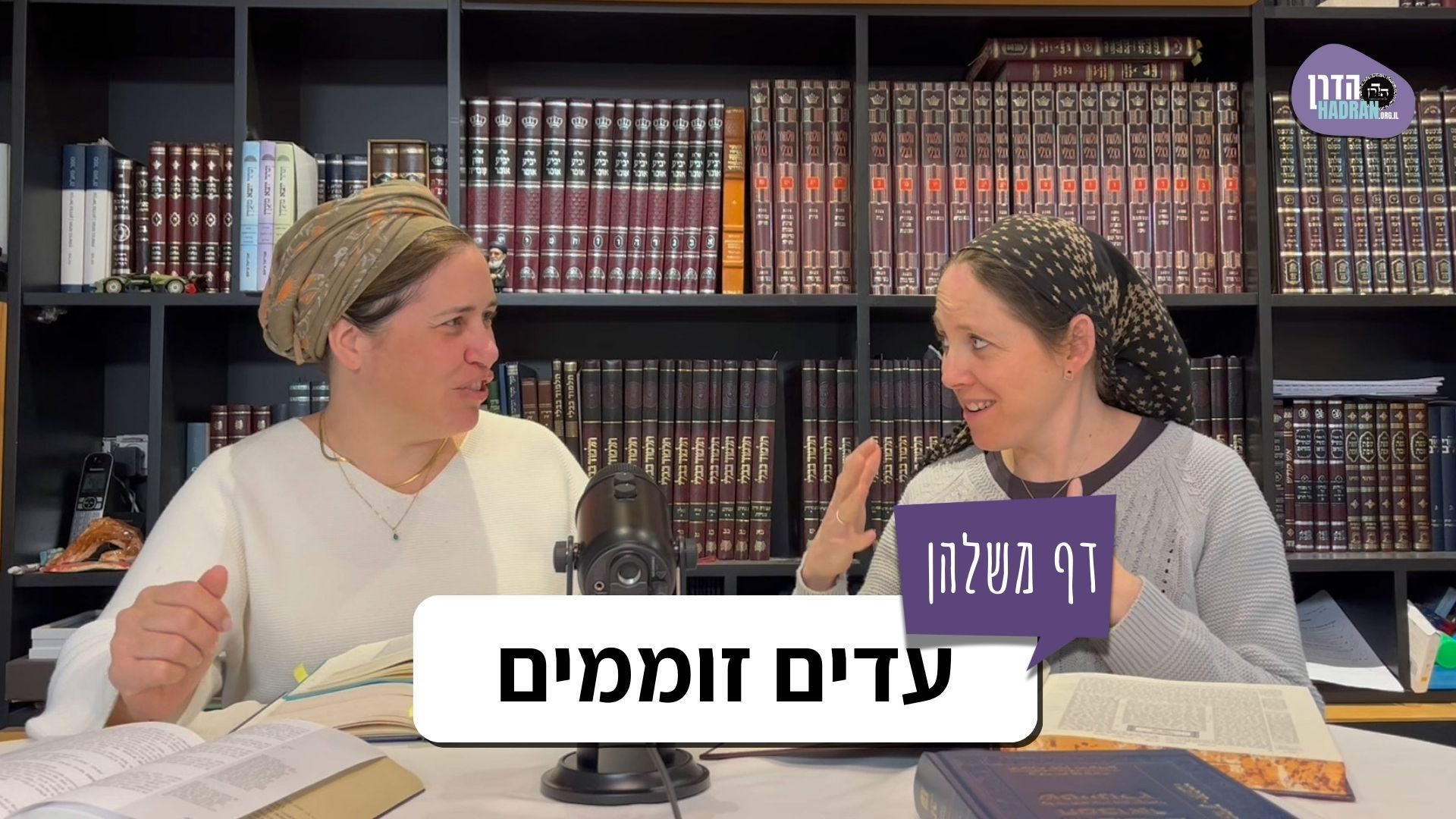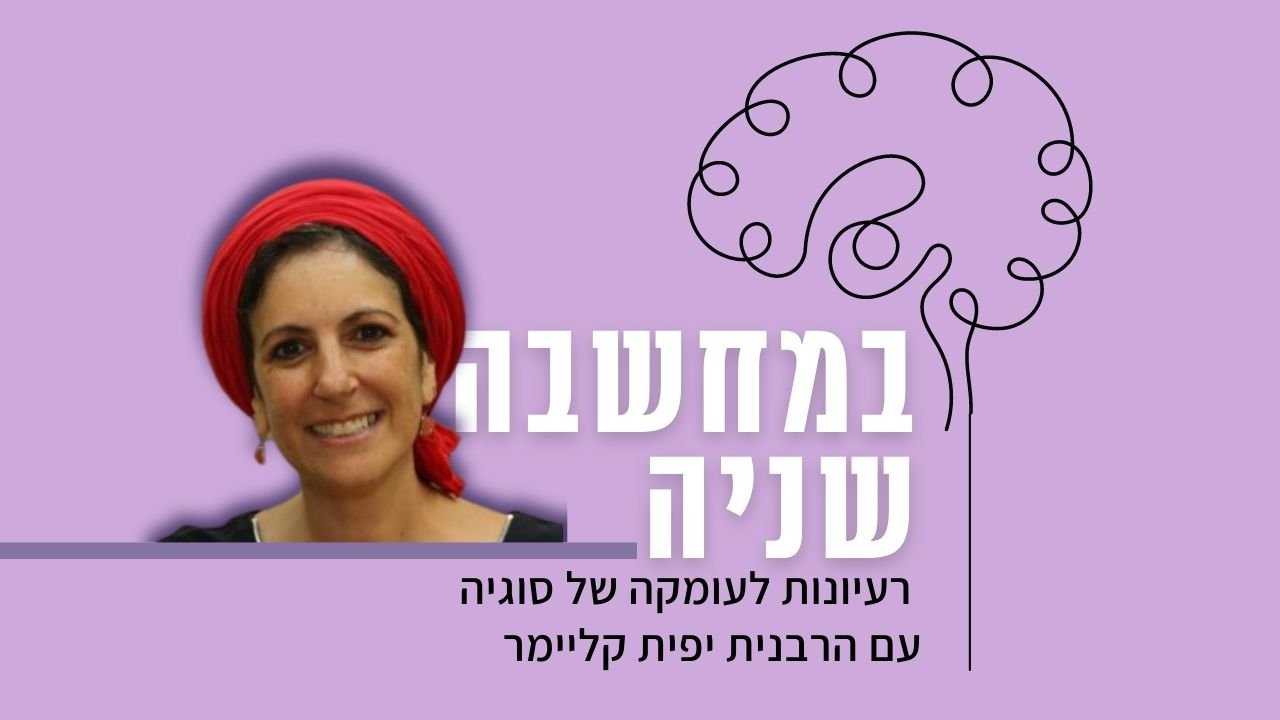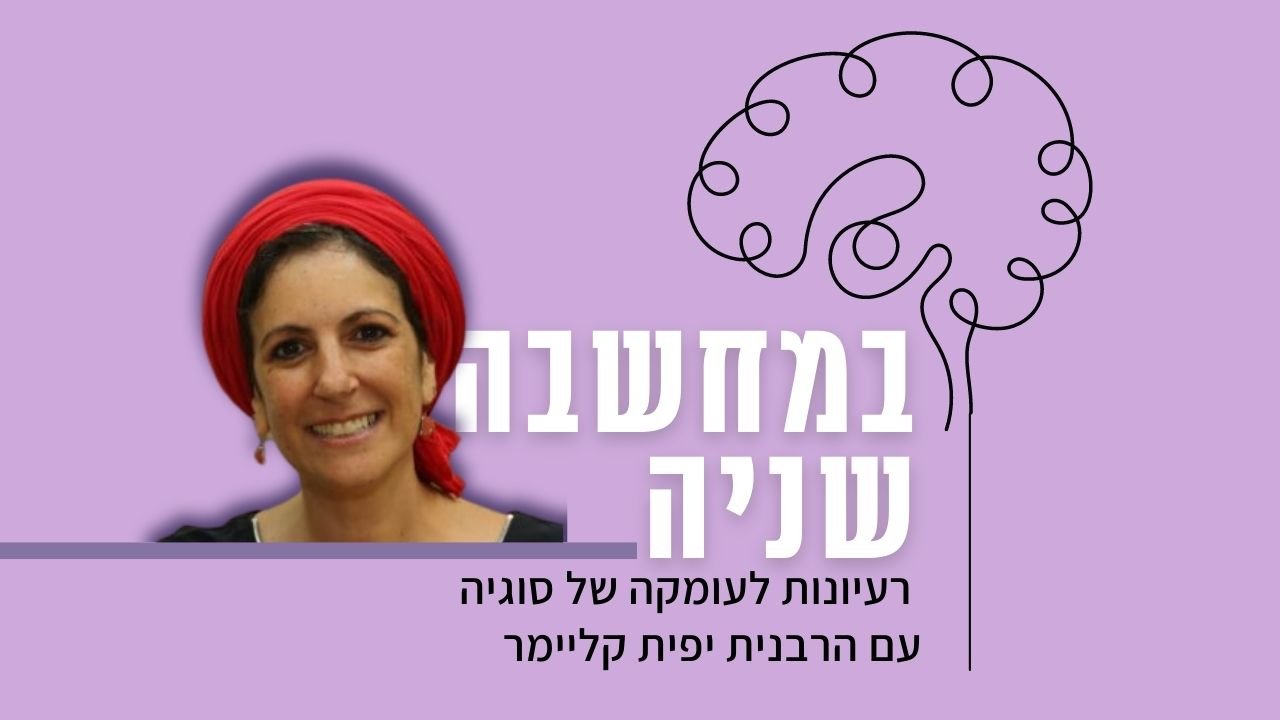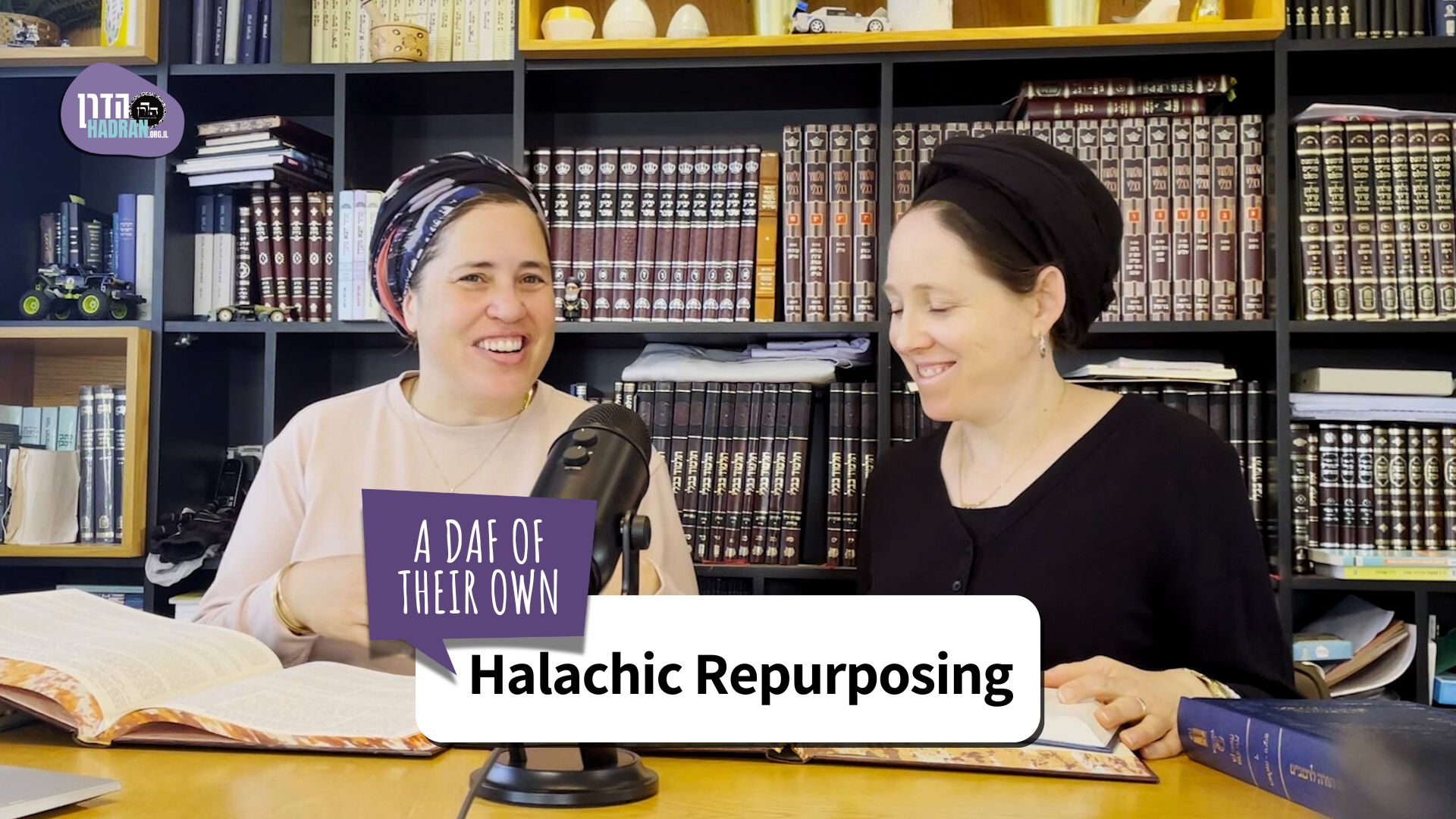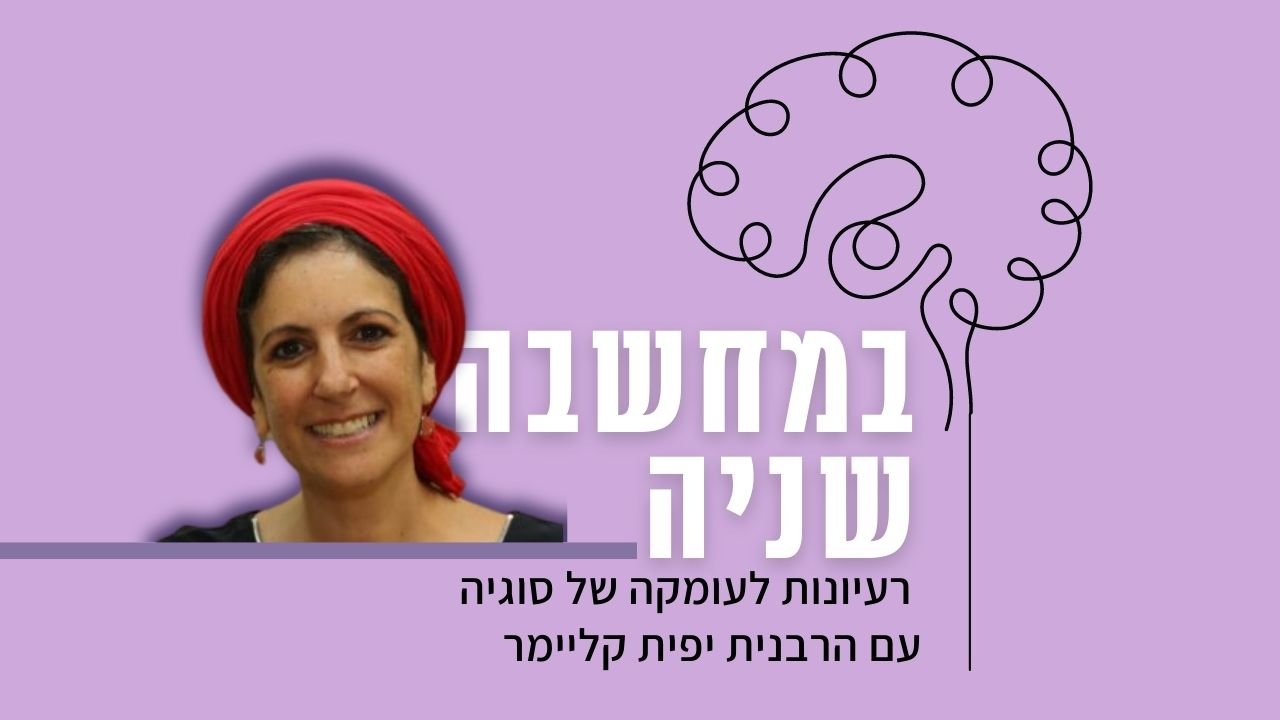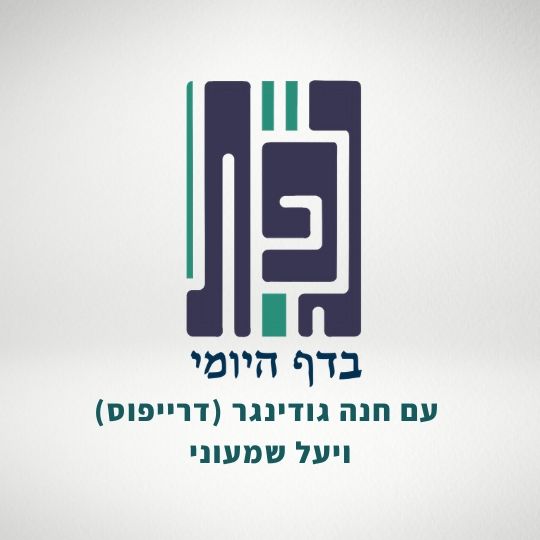באיזה מקרה מדובר בכל חלקי המשנה? ששה אמוראים מביאים כל אחד פירוש אחר. הגמרא גם מסבירה למה כל אחד לא קיבל את ההסברים של האחרים.
הלימוד השבוע מוקדש לזכות ולשלום הַיְימׇנוֹט אֱמוּנָה בַּת באנצ’י (קָסָאוּ) בת 11 שנעלמה במקום מגוריה בצפת, לפני שנתיים, ביום ט”ז אדר תשפ”ד (25.2.24), ולא נודעו עקבותיה.
הלימוד השבוע מוקדש למען ביטחון המדינה, החיילים והאזרחים, ולמען חירותו של העם האיראני. שנזכה בקרוב שיתקיים בנו הפסוק: "לַיְּהוּדִים הָיְתָה אוֹרָה וְשִׂמְחָה וְשָׂשֹׂן וִיקָר”.
הלימוד השבוע מוקדש לזכות וְלִשְׁלוֹם הָיימָנוֹט אֱמוּנָה בַּת באנצ’י (קָסָאוּ), בת 11 שנעלמה במקום מגוריה בצפת, לפני שנתיים, ביום ט”ז אדר תשפ״ד (25.2.24), ולא נודעו עקבותיה. אנו מתפללים שֶׁתִּמָּצֵא וְתוּשַׁב לביתה במהרה!
רוצה להקדיש שיעור?

כלים
הלימוד השבוע מוקדש לזכות ולשלום הַיְימׇנוֹט אֱמוּנָה בַּת באנצ’י (קָסָאוּ) בת 11 שנעלמה במקום מגוריה בצפת, לפני שנתיים, ביום ט”ז אדר תשפ”ד (25.2.24), ולא נודעו עקבותיה.
הלימוד השבוע מוקדש למען ביטחון המדינה, החיילים והאזרחים, ולמען חירותו של העם האיראני. שנזכה בקרוב שיתקיים בנו הפסוק: "לַיְּהוּדִים הָיְתָה אוֹרָה וְשִׂמְחָה וְשָׂשֹׂן וִיקָר”.
הלימוד השבוע מוקדש לזכות וְלִשְׁלוֹם הָיימָנוֹט אֱמוּנָה בַּת באנצ’י (קָסָאוּ), בת 11 שנעלמה במקום מגוריה בצפת, לפני שנתיים, ביום ט”ז אדר תשפ״ד (25.2.24), ולא נודעו עקבותיה. אנו מתפללים שֶׁתִּמָּצֵא וְתוּשַׁב לביתה במהרה!
כלים
העמקה
רוצה להבין מה באמת קורה מתחת לפני השטח של הסוגיה?
שיעורים, פודקאסטים והרחבות של מיטב המורות שלנו יפתחו לך עוד זוויות וכיווני חשיבה.
חדשה בלימוד הגמרא?
זה הדף הראשון שלך? איזו התרגשות עצומה! יש לנו בדיוק את התכנים והכלים שיעזרו לך לעשות את הצעדים הראשונים ללמידה בקצב וברמה שלך, כך תוכלי להרגיש בנוח גם בתוך הסוגיות המורכבות ומאתגרות.
פסיפס הלומדות שלנו
גלי את קהילת הלומדות שלנו, מגוון נשים, רקעים וסיפורים. כולן חלק מתנועה ומסע מרגש ועוצמתי.
חולין ג
חרב הרי הוא כחלל אב הטומאה הוא לטמייה לסכין ואזל סכין וטמיתיה לבשר
It is derived from the juxtaposition of “slain” to “sword” that the halakhic status of a sword or any other metal vessel that comes into contact with a corpse is like that of a corpse itself. Similarly, if a metal utensil comes in contact with a person impure with impurity imparted by a corpse, it assumes his status. Therefore, since the impure person is a primary source of ritual impurity, let him render the knife impure, rendering it as well a primary source of impurity, and the knife then goes and renders the flesh impure.
אלא דאיטמי בשרץ ואי בעית אימא לעולם דאיטמי במת וכגון שבדק קרומית של קנה ושחט בה דתניא בכל שוחטים בין בצור בין בזכוכית בין בקרומית של קנה
Rather, it is a case where the person became impure with impurity imparted by a creeping animal; as he assumes first-degree ritual impurity status and does not render vessels impure, the knife remains ritually pure. And if you wish, say instead that actually he became impure with impurity imparted by a corpse, and it is a case where one examined the stalk of a reed, which is a flat wooden vessel that does not become ritually impure, to ensure that it is perfectly smooth with no nicks, and slaughtered with it, as it is taught in a baraita: One may slaughter an animal with any sharp object, whether with a flint, or with glass shards, or with the stalk of a reed.
אביי אמר הכי קתני הכל שוחטין ואפילו כותי במה דברים אמורים כשישראל עומד על גביו אבל יוצא ונכנס לא ישחוט
§ Abaye said in resolution of the apparent contradiction in the mishna that this is what the mishna is teaching: Everyone slaughters, and even a Samaritan. In what case is this statement said? It is said in a case where a Jew is standing over him and ensuring that he slaughters properly; but if the Jew merely exits and enters and does not have a constant presence, the Samaritan may not slaughter the animal.
ואם שחט חותך כזית בשר ונותן לו אכלו מותר לאכול משחיטתו לא אכלו אסור לאכול משחיטתו
And if the Samaritan slaughtered the animal without supervision, the Jew cuts an olive-bulk of meat from the slaughtered animal and gives it to the Samaritan to eat. If the Samaritan ate it, it is permitted for the Jew to eat meat from what the Samaritan slaughtered. Since Samaritans are meticulous with regard to the meat that they eat and eat meat only from an animal that was slaughtered properly, the Jew may partake of the meat. But if the Samaritan did not eat the meat, there is concern that the animal was not slaughtered properly, and it is prohibited to eat from what the Samaritan slaughtered.
חוץ מחרש שוטה וקטן דאפילו דיעבד נמי לא שמא ישהו שמא ידרסו ושמא יחלידו
And it teaches: This is the halakha with regard to all people except for a deaf-mute, an imbecile, and a minor, who, even if they slaughtered only non-sacred animals, their slaughter is not valid even after the fact. The reason the Sages deemed such slaughter not valid is lest people in these categories interrupt the slaughter, lest they press the knife in the course of slaughter, and lest they conceal the knife beneath the windpipe or the gullet in the course of an inverted slaughter.
וכולן ששחטו אהייא אילימא אחרש שוטה וקטן עלה קאי ואם שחטו מבעי ליה
The Gemara asks: If so, with regard to the clause in the mishna that follows: And any of them who slaughtered an animal and others see and supervise them, their slaughter is valid, to which case in the mishna is it referring? If we say that the reference is to the case of a deaf-mute, an imbecile, and a minor, since that is the halakha to which it stands adjacent, the tanna should have formulated the phrase: And if they slaughtered, instead of: And any of them who slaughtered.
אלא אכותי הא אמרת כשישראל עומד על גביו שחיט אפילו לכתחלה קשיא
Rather, perhaps the reference is to the case of a Samaritan who slaughters. The Gemara rejects that possibility. But didn’t you say in that case: When a Jew is standing over him, a Samaritan may slaughter even ab initio? The Gemara concedes that the formulation of the mishna: And any of them who slaughtered, is difficult according to this explanation of the mishna.
אמר רבא ויוצא ונכנס לכתחלה לא והתנן המניח עובד כוכבים בחנותו וישראל יוצא ונכנס מותר התם מי קתני מניח המניח קתני דיעבד
Rava said: And in a case where a Jew exits and enters, is it not permitted for the Samaritan to slaughter the animal ab initio? But didn’t we learn in a mishna (Avoda Zara 69a): In the case of one who leaves a gentile in his store in which there is wine, and a Jew exits and enters, the wine is permitted? Just as there, the sporadic presence of the Jew is sufficient to ensure that the gentile will refrain from touching the wine, it should be sufficient in the case of a Samaritan who slaughters an animal as well. The Gemara rejects that proof. There, in the case of the store, does the tanna teach: One leaves a gentile ab initio? The tanna teaches: One who leaves, after the fact. Consequently, there is no proof from there that the Jew’s sporadic presence is sufficient to permit slaughter by a Samaritan ab initio.
אלא מהכא אין השומר צריך להיות יושב ומשמר אלא אע”פ שיוצא ונכנס מותר
Rather, proof can be cited from the mishna here (Avoda Zara 61a): In a case where barrels of wine belonging to a Jew are in the possession of a gentile, and a Jew was tasked with supervising those barrels, the supervisor need not be continuously sitting and supervising to ensure that the gentile does not touch the wine; rather, even if the supervisor exits and enters, the wine is permitted. This mishna clearly indicates that exiting and entering is sufficient even ab initio.
אלא אמר רבא הכי קתני הכל שוחטין ואפי’ כותי בד”א כשישראל יוצא ונכנס אבל בא ומצאו ששחט חותך כזית בשר ונותן לו אכלו מותר לאכול משחיטתו לא אכלו אסור לאכול משחיטתו
Rather, Rava said in resolution of the apparent contradiction similar to the resolution proposed by Abaye, that this is what the mishna is teaching: Everyone slaughters, and even a Samaritan. In what case is this statement said? It is said in a case where a Jew exits and enters; but if the Jew does not exit and enter and instead came and found that the Samaritan slaughtered the animal, the Jew cuts an olive-bulk of meat from the slaughtered animal and gives it to the Samaritan to eat. If the Samaritan ate it, it is permitted for the Jew to eat meat from what the Samaritan slaughtered. But if the Samaritan did not eat the meat, it is prohibited to eat from what the Samaritan slaughtered.
חוץ מחרש שוטה וקטן דאפילו דיעבד נמי לא שמא ישהו ושמא ידרסו ושמא יחלידו וכולן ששחטו אהייא אילימא אחרש שוטה וקטן עלה קאי ואם שחטו מבעי ליה
And it teaches: This is the halakha with regard to all people except for a deaf-mute, an imbecile, and a minor, whose slaughter is not valid even after the fact. The reason the Sages deemed such slaughter not valid is lest people in these categories interrupt the slaughter, lest they press the knife in the course of slaughter, and lest they conceal the knife beneath the windpipe or the gullet in the course of an inverted slaughter. The Gemara asks: If so, with regard to the clause in the mishna that follows: And any of them who slaughtered an animal and others see and supervise them, their slaughter is valid, to which case in the mishna is this referring? If we say that the reference is to the case of a deaf-mute, an imbecile, and a minor, since that is the halakha to which it stands adjacent, the tanna should have formulated the phrase: And if they slaughtered, instead of: And any of them who slaughtered.
אלא אכותי הא אמרת אפילו יוצא ונכנס שחיט לכתחלה קשיא
Rather, perhaps the reference is to the case of a Samaritan who slaughters. The Gemara rejects that possibility. But didn’t you say that if a Jew is present, then even if he exits and enters and does not have a constant presence, a Samaritan may slaughter even ab initio? The Gemara concedes that the formulation of the mishna: And any of them who slaughtered, is difficult according to this explanation of the mishna.
רב אשי אמר הכי קתני הכל שוחטין ואפילו ישראל מומר מומר למאי לאכול נבילות לתיאבון וכדרבא דאמר רבא ישראל מומר אוכל נבילות לתיאבון
§ Rav Ashi said in resolution of the apparent contradiction in the mishna that this is what the mishna is teaching: Everyone slaughters, and even a Jewish transgressor [meshummad]. The Gemara asks: A transgressor of what sort? The Gemara answers: It is one whose transgression is to eat unslaughtered animal carcasses to satisfy his appetite, i.e., for his convenience. And the ruling of the mishna is in accordance with the statement of Rava, as Rava says: In the case of a Jewish transgressor whose transgression is that he eats unslaughtered animal carcasses to satisfy his appetite, if he seeks to slaughter an animal,
בודק סכין ונותן לו ומותר לאכול משחיטתו אבל לא בדק ונתן לו לא ישחוט ואם שחט בודק סכינו אחריו נמצאת סכינו יפה מותר לאכול משחיטתו ואם לאו אסור לאכול משחיטתו
one examines a knife to ensure that it is perfectly smooth with no nicks and gives it to the transgressor, and it is permitted to eat from what he slaughtered. But if one did not examine the knife and give it to the transgressor, the transgressor may not slaughter an animal ab initio. And if the transgressor slaughtered an animal, one examines his knife after his slaughter. If his knife is found to be perfectly smooth, it is permitted to eat meat from what he slaughtered, and if not, it is prohibited to eat from what he slaughtered.
חוץ מחרש שוטה וקטן דאפילו דיעבד נמי לא שמא ישהו שמא ידרסו ושמא יחלידו וכולן ששחטו אהייא אילימא אחרש שוטה וקטן עלה קאי ואם שחטו מיבעי ליה
And it teaches: This is the halakha with regard to all people except for a deaf-mute, an imbecile, and a minor, whose slaughter is not valid even after the fact. The reason the Sages deemed such slaughter not valid is lest people in these categories interrupt the slaughter, lest they press the knife in the course of slaughter, and lest they conceal the knife beneath the windpipe or the gullet in the course of an inverted slaughter. The Gemara asks: If so, with regard to the clause in the mishna that follows: And any of them who slaughtered an animal and others see and supervise them, their slaughter is valid, to which case in the mishna is it referring? If we say that the reference is to the case of a deaf-mute, an imbecile, and a minor, since that is the halakha to which it stands adjacent, the tanna should have formulated the phrase: And if they slaughtered, instead of: And any of them who slaughtered.
אלא אישראל מומר אי דבדק סכין ונותן לו הא אמרת שוחט לכתחלה אלא דלא בדק אי דאיתיה לסכין ליבדקיה השתא ואי דליתיה לסכין כי אחרים רואין אותו מאי הוי דלמא בסכין פגומה שחיט קשיא
Rather, perhaps the reference is to the case of a Jewish transgressor who slaughters. The Gemara asks: In what case? If it is a case where one examined a knife and gave it to the transgressor, didn’t you say in that case that the transgressor may slaughter ab initio? Rather, perhaps the reference is to a case where one did not examine the knife. If it is a case where the knife is available, let him examine the knife now to make sure that there are no nicks. And if it is a case where the knife is not available, then when others see him slaughter, what of it? How can one eat from what he slaughtered? Perhaps he slaughtered the animal with a notched knife. The Gemara concedes that the formulation of the mishna: And any of them who slaughtered, is difficult according to this explanation of the mishna.
רבינא אמר הכי קתני הכל שוחטין הכל מומחין שוחטין מומחין ואע”פ שאין מוחזקין
§ Ravina said in resolution of the apparent contradiction in the mishna that this is what the mishna is teaching: Everyone slaughters, i.e., everyone who is an expert in the halakhot of ritual slaughter slaughters; all experts are qualified to slaughter, and this is the halakha even if they are not established as accustomed to slaughter with a steady hand and without fainting.
בד”א שיודעין בו שיודע לומר הלכות שחיטה אבל אין יודעין בו שיודע לומר הלכות שחיטה לא ישחוט ואם שחט בודקין אותו אם יודע לומר הלכות שחיטה מותר לאכול משחיטתו ואם לאו אסור לאכול משחיטתו
In what case is this statement said? It is said in a case where people know about him that he knows and is able to recite the halakhot of ritual slaughter. But if people do not know about him that he knows and is able to recite the halakhot of ritual slaughter, he may not slaughter an animal ab initio. And if he slaughtered an animal, one examines him; if he knows and is able to recite the halakhot of ritual slaughter it is permitted to eat meat from what he slaughtered, and if not, it is prohibited to eat from what he slaughtered.
חוץ מחרש שוטה וקטן דאפילו דיעבד נמי לא שמא ישהו שמא ידרסו ושמא יחלידו וכולן ששחטו אהייא אילימא אחרש שוטה וקטן עלה קאי ואם שחטו מבעי ליה
And it teaches: This is the halakha with regard to all people except for a deaf-mute, an imbecile, and a minor, whose slaughter is not valid even after the fact. The reason the Sages deemed such slaughter not valid is lest people in these categories interrupt the slaughter, lest they press the knife in the course of slaughter, and lest they conceal the knife beneath the windpipe or the gullet in the course of an inverted slaughter. The Gemara asks: If so, with regard to the clause in the mishna that follows: And any of them who slaughtered an animal and others see and supervise them, their slaughter is valid, to which case in the mishna is this referring? If we say that the reference is to the case of a deaf-mute, an imbecile, and a minor, since that is the halakha to which it stands adjacent, the tanna should have formulated the phrase: And if they slaughtered, instead of: And any of them who slaughtered.
אלא אשאין מומחין בבודקין אותו סגי דליתיה לקמן דליבדקיה
Rather, perhaps the reference is to a case where they are not experts. The Gemara rejects the possibility that they are not experts, as in that case, if one examines him after the slaughter to determine his expertise in the halakhot of ritual slaughter, it is sufficient. The Gemara answers: Supervision is necessary in the case where the one who slaughtered the animal is not before us so that we can examine him.
ואיכא דאמרי רבינא אמר הכי קתני הכל שוחטין הכל מוחזקין שוחטין מוחזקין אע”פ שאין מומחין בד”א ששחטו לפנינו ב’ וג’ פעמים ולא נתעלף אבל לא שחט לפנינו ב’ וג’ פעמים לא ישחוט שמא יתעלף ואם שחט ואמר ברי לי שלא נתעלפתי שחיטתו כשרה
And there are those who say that Ravina said that this is what the mishna is teaching: Everyone slaughters, i.e., everyone who is established as accustomed to slaughter with a steady hand and without fainting slaughters; all those established concerning this are qualified to slaughter, even if it is not known if they are experts. In what case is this statement said? It is said in a case where they slaughtered before us two or three times and did not faint. But if he did not slaughter before us two or three times he may not slaughter an animal ab initio, lest he faint. And if he slaughtered an animal and said: It is clear to me that I did not faint, his slaughter is valid.
חוץ מחרש שוטה וקטן דאפילו דיעבד נמי לא שמא ישהו שמא ידרסו ושמא יחלידו וכולן ששחטו אהייא אילימא אחרש שוטה וקטן עלה קאי ואם שחטו מיבעי ליה
And it teaches: This is the halakha with regard to all people except for a deaf-mute, an imbecile, and a minor, whose slaughter is not valid even after the fact. The reason the Sages deemed such slaughter not valid is lest people in these categories interrupt the slaughter, lest they press the knife in the course of slaughter, and lest they conceal the knife beneath the windpipe or the gullet in the course of an inverted slaughter. The Gemara asks: If so, with regard to the clause in the mishna that follows: And any of them who slaughtered an animal and others see and supervise them, their slaughter is valid, to which case in the mishna is this referring? If we say that the reference is to the case of a deaf-mute, an imbecile, and a minor, since that is the halakha to which it stands adjacent, the tanna should have formulated the phrase: And if they slaughtered, instead of: And any of them who slaughtered.
אלא אשאין מוחזקין והאמרת בברי לי סגי דליתיה קמן דלישייליה
Rather, perhaps the reference is to a case where they are not established as accustomed to slaughter with a steady hand and without fainting. The Gemara rejects that possibility, as in that case, didn’t you say that if one said after the slaughter: It is clear to me that I did not faint, it is sufficient? The Gemara answers: Supervision is necessary in the case where the one who slaughtered the animal is not before us so that we can ask him whether he fainted.
רבינא ורבה בר עולא כאביי ורבא ורב אשי לא אמרי משום דקשיא להו וכולן
The Gemara summarizes: Ravina and Rabba bar Ulla did not say a resolution to the apparent contradiction in the mishna like that of Abaye, Rava, and Rav Ashi due to the fact that the phrase in the mishna: And any of them who slaughtered, is difficult for them.
כולהו כרבה בר עולא לא אמרי להך לישנא דאמרת הכא עיקר אדרבה התם עיקר דבקדשים קאי
All of the other amora’im did not say a resolution to the apparent contradiction in the mishna like that of Rabba bar Ulla, who interprets the mishna as referring to the case of a ritually impure person; according to that version that you said: The mishna here is the primary source for the halakha of a ritually impure person who slaughtered a sacrificial animal, the other amora’im reject this interpretation because, on the contrary, the mishna there is the primary source, as it is standing in tractate Zevaḥim, which deals with sacrificial animals.
להך לישנא דאמרת התם עיקר והכא איידי דתנא טמא בחולין תנא נמי טמא במוקדשין טמא בחולין גופיה לא איצטריכא ליה חולין שנעשו על טהרת קדש לאו כקדש דמו
The amora’im also reject the interpretation according to that other version that you said: The mishna there is the primary source, and here, since the tanna taught the case of a ritually impure person who slaughtered non-sacred animals, he teaches the case of a ritually impure person who slaughtered sacrificial animals as well. The reason is that it was not necessary for the tanna to teach the case itself of a ritually impure person who slaughtered a non-sacred animal, as in the opinion of the other amora’im, the halakhic status of non-sacred foods that were prepared according to the strictures of sacrificial food is not like that of sacrificial food, and it is permitted to render such food impure.
כולהו כרבינא לא אמרי להך לישנא דאמר מומחין אין שאין מומחין לא רוב מצויין אצל שחיטה מומחין הן
All of the other amora’im did not say a resolution to the apparent contradiction in the mishna like that of Ravina; according to that version that he said: Experts, yes, may slaughter ab initio, but those that it is not known that they are experts, no, they may not slaughter ab initio, the other amora’im disagree because they hold that the majority of those associated with slaughter are experts. Therefore, even if it is not known whether they are experts, their slaughter is valid.
להך לישנא דאמר מוחזקין אין שאין מוחזקין לא לעלופי לא חיישינן
According to that version that Ravina said: People who are established as accustomed to slaughter without fainting, yes, they may slaughter ab initio, but people who are not established as accustomed to slaughter without fainting, no, they may not slaughter ab initio, the other amora’im disagree because they hold that we are not concerned for the possibility of fainting.
רבא לא אמר כאביי כי קושייה אביי לא אמר כרבא התם לא נגע הכא נגע
Rava did not say a resolution like that of Abaye, that the mishna is referring to a Samaritan, in accordance with the difficulty that he raised from the halakha of wine belonging to a Jew to which a gentile has access. Abaye did not say a resolution like that of Rava, that a Samaritan may slaughter ab initio if a Jew enters and exits, because there, in the case of wine, the gentile does not touch the wine; therefore, it is sufficient if the Jew enters and exits. Here, in the case of slaughter, the Samaritan touches the animal in the course of slaughter, and he can disqualify the slaughter in an instant. Therefore, Abaye holds that it is insufficient for a Jew to enter and exit.
רב אשי לא אמר כתרוייהו קסבר כותים גרי אריות הן
Rav Ashi did not say a resolution like that of both of them, Abaye and Rava, because he holds: Samaritans are converts who converted under duress due to the threat posed by lions, and their conversion is void; therefore, their halakhic status is that of a gentile, whose slaughter is not valid.
אביי לא אמר כרב אשי לא סבירא ליה הא דרבא אלא רבא מאי טעמא לא אמר כשמעתיה
Abaye did not say a resolution like that of Rav Ashi, who interprets the mishna as referring to a Jewish transgressor whose transgression is that he eats unslaughtered animal carcasses to satisfy his appetite, because he does not hold that which Rava said, that such a transgressor may slaughter ab initio if his knife is examined beforehand by someone reliable. But as for Rava, what is the reason that he did not say a resolution in accordance with his own statement of halakha with regard to the slaughter of a transgressor and explain the mishna in the manner that Rav Ashi did?
לדבריו דאביי קאמר וליה לא סבירא ליה:
The Gemara answers: When Rava explained that the tanna in the mishna is referring to the slaughter of a Samaritan, he stated his opinion in accordance with the statement of Abaye in order to resolve the difficulty that Abaye raised; but he himself does not hold accordingly.
תנו רבנן שחיטת כותי מותרת במה דברים אמורים כשישראל עומד על גביו אבל בא ומצאו ששחט חותך כזית ונותן לו אכלו מותר לאכול משחיטתו ואם לאו אסור לאכול משחיטתו
§ The Sages taught in a baraita: The slaughter performed by a Samaritan is permitted ab initio. In what case is this statement said? It is said in a case where there is a Jew standing over him and supervising to ensure that the slaughter was performed properly. But if the Jew came and found that the Samaritan already slaughtered the animal, the Jew cuts an olive-bulk of meat from the slaughtered animal and gives it to the Samaritan to eat. If the Samaritan ate it, it is permitted for the Jew to eat meat from what the Samaritan slaughtered. But if the Samaritan did not eat the meat, it is prohibited to eat from what the Samaritan slaughtered.
כיוצא בו מצא בידו
Similarly, if the Jew found in the possession of a Samaritan
